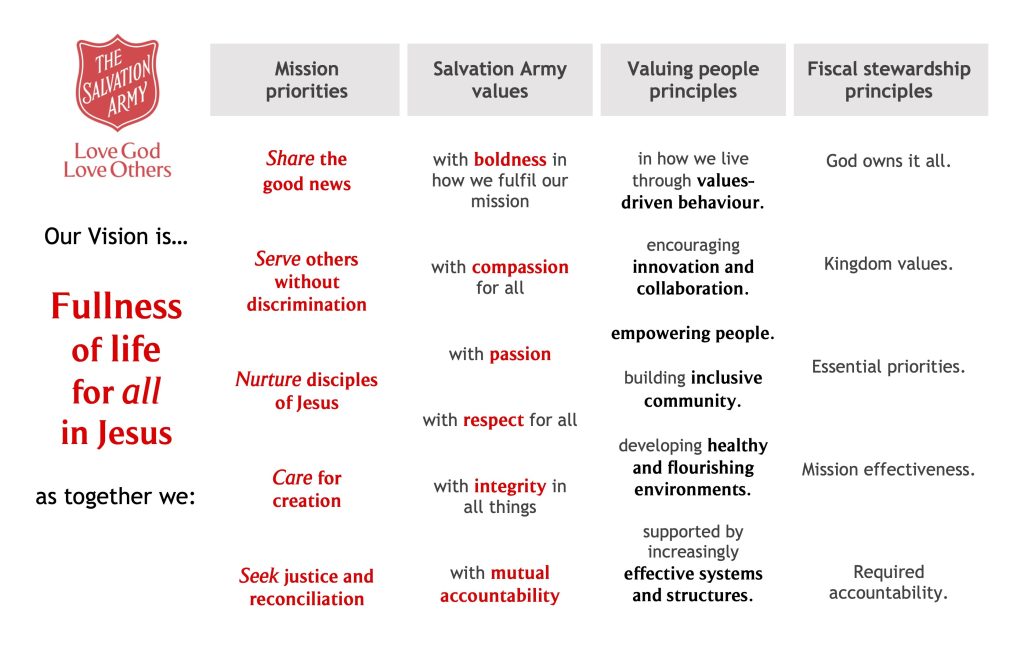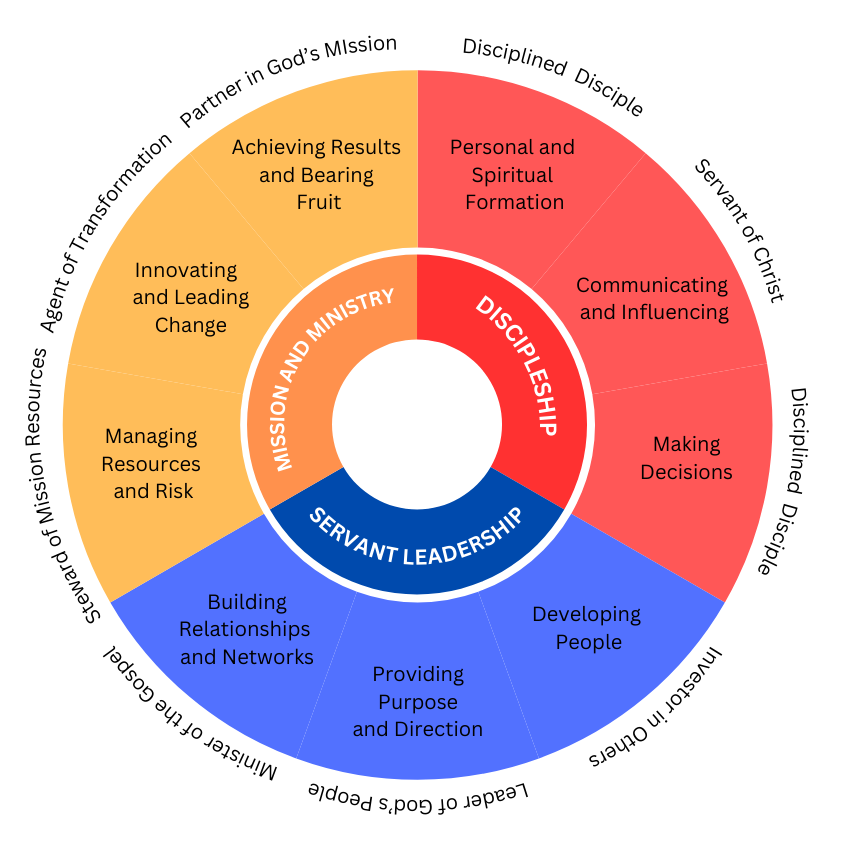Introducing the Spiritual Leader Competency Framework
Why this framework?
This framework is presented as part of a leader development strategy, building on the Vocational Development Pathway.
In The Salvation Army we lead and manage in many ways. Perhaps you manage or lead a team? Maybe you have very few or no direct reports, but are responsible for delivering complex projects or programmes or are a thought leader in your field? Whatever your role, this leadership framework is offered, which describes The Salvation Army way of leading we want to aspire to and supports the broadening and deepening of our servant leadership.
The framework aims to support engagement of individuals and teams in their own development, along with access to appropriate resources.
Where has this come from?
In response to leadership concerns for the future, the brief from senior leadership was to ‘develop a robust framework for officer and employed spiritual leader development to underpin every aspect of The Salvation Army mission throughout the UKI Territory’, through’ vocational and leadership development, succession planning, performance management and mutual accountability’. This is to support the flourishing and fruitfulness of people and mission, contributing to building a Kingdom culture.
How does it fit in with The Salvation Army identity and priorities?
Our identity work: vision, mission, values including the valuing people framework and fiscal stewardship principles underpin the framework and are woven throughout.

How does our identity inform how we lead?
The character and action of Jesus is love. We need to continually be drawn back to understand how God is asking us to live and work together, to help us be faithful to our calling to be God’s people.
Servant leadership
Jesus embodied servant leadership through his whole ministry, particularly symbolised in washing the feet of his disciples, saying ‘I have set you an example that you should do as I have done for you (John 13:15), teaching that the disciples were called to be servants.
The spiritual leader as servant recognises that all people of the Body of Christ have gifts in ministry to be developed and used, becoming enabler, equipper and mobiliser of the ministry of others for spiritual service.
read more...
Spiritual leadership and servant leadership are synonymous in the Church of Christ, exemplified in Jesus, who said to his disciples, ‘Whoever wants to be great among you must be your servant, and whoever wants to be first must be your slave- just as the Son of Man did not come to be served but to serve, and to give his life as a ransom for many’ (Matt 20:26-28).
Servant leaders discover power by giving it up, refuse to use their positions to control people or to use them as steppingstones, enhancing their power by sharing it with others. Servanthood is the primary calling and mission of the church. Leaders must take their authority seriously, exercise it responsibly and not be intoxicated by it, understanding that the power entrusted to them is the power to empower others. The Army will continue to nurture servanthood.
Robert K Greenleaf, in his book ‘Servant Leadership: Journey into the Nature of Legitimate Power and Greatness’ suggests a great leader is seen as a servant first, expanding this as an essential principle in secular leadership, and not solely the prerogative of spiritual leadership.
(References from ‘Servants Together – Salvationist Perspectives on Ministry’.)
Holiness
‘As Salvationists we are called to restate and live out the doctrine of holiness in all its dimensions – personal, relational, social and political, in the context of our cultures and in the idioms of our day…’ (International Spiritual Life Commission). We are reminded that all our relationships should be regarded as holy covenants (Handbook of Doctrine p197) and we cannot be holy as an individual without being holy in interaction with others, our relationships being determined by our holiness, marked by qualities of life described by Paul as ‘the fruit of the Spirit’ (Galatians 5:22-26), love, joy, peace, patience, kindness, goodness, faithfulness, gentleness and self-control…’. To this end, the Spiritual Leadership Competency Framework also offers the lens of Personal Holiness, Relational Holiness and Social Holiness to help us reflect on our personal spiritual experience, our life in Christian community and our interaction with the world.
How does this framework help us understand what growing and maturing in leadership look like?
The framework is structured in three themes with three sub-themes each with four competencies (see the full table):
- DISCIPLESHIP – personal holiness:
Personal and Spiritual Formation
Communicating and Influencing
Making Decisions - SERVANT LEADERSHIP – relational holiness
Developing People
Providing Purpose and Direction
Building Relationships and Networks - MISSION AND MINISTRY – social holiness
Managing Resources and Risk
Innovating and Leading Change
Achieving Results and Bearing Fruit

Each of the competencies has four standards designed to help us measure where we are and where we can develop and mature in each competency:
Emerging Leader
The ‘Emerging’ standard indicates a foundational level of development and understanding. Individuals at this stage are beginning to explore and practice essential skills and behaviours. They show an awareness of key concepts and demonstrate a willingness to engage in personal and spiritual growth. This stage is characterised by initial efforts and learning, requiring support and guidance.
More detail
Competent Leader
The ‘Competent’ standard signifies a proficient level of ability and consistency in applying skills and knowledge. Individuals at this level can effectively balance various aspects of their roles, such as personal, professional, and spiritual responsibilities. They demonstrate confidence and a deeper understanding of practices and principles. Competent individuals can work independently, applying their learning in practical, everyday contexts.
More detail
Releasing Leader
The ‘Releasing’ standard represents a more advanced level of leadership and influence. Individuals at this stage not only demonstrate competence but also actively foster growth in others. They create environments that encourage trust, creativity, and collaboration. Releasing leaders’ model best practices, mentor others, and facilitate opportunities for leaning and development. They are proactive in addressing challenges and supporting the wider community.
More detail
Transforming Leader
The ‘Transforming’ standard indicates a highly developed and impactful level of leadership and influence. Individuals at this stage champion significant cultural change in their context. They inspire and guide others through transformative processes, promoting continuous improvement and innovation. Transforming leaders exhibit a profound understanding of their mission and values, shaping strategic direction and fostering environments of mutual accountability and spiritual growth.
More detail
In this stage the person’s life and development from all the previous stages has resulted in a leader in whom wisdom, spiritual authority and great capabilities are evident as the person models flourishing leadership at its best. This person thinks strategically, has a clear vision to move towards and is able to cast that vision in a way that others are inspired and enthused to own it, and is able to set a culture in which other people are able to flourish. In this stage the person is able to bring about transformational change, is comfortable with ambiguity, manages chaos and order and lives and fosters interdependence. In terms of their use of power they act in the service of others, their self takes second place, and they are all about empowering others. In terms of faith this person is able to see beyond the boundaries of particular rules or religions, treating everyone with love and justice, developing community of love and justice. They live their life in the constant awareness of the presence of Jesus and the likeness of Jesus is formed in every aspect of their character. The simplicity of their love for Jesus shapes decisions and lifestyle.
These definitions encapsulate the progressive nature of development and leadership within the context of ministry and leadership competencies, providing clear benchmarks for growth and assessment. The standards are not role based. The purpose of standards is to show maturing.
How does the framework help us consider our whole selves in life and ministry?
‘Knowing, being, doing’ is a framework to support Salvation Army leaders sustain and develop their personal spiritual life in the context of an activist, missional organisation, by encouraging us to engage in reflecting holistically on our life. It assumes that our whole life is ‘spiritual’, lived in the presence of God, and that all we do is shaped by our relationship with God.”
Knowing – includes what we believe and why we believe it, our understanding of the world in which we live and our understanding of people. Knowing is not only related to academic learning.
Being – specifically relates to our personal relationship with God and includes how our inner life is shaped by Christ, our Christian character and who we have the potential to become.
Doing – the Christian life is never complete unless it results in a ‘way of being in the world’. What should we do? How should we act? What choices do we make?
All three areas are important for mature spirituality and Christian leadership. In understanding and reflecting on the interrelationship between them we can ensure our spiritual life is holistic, grounded, and dynamic. Each element influences the other two and our lives are diminished when they are not blended. We need to habitually make deliberate connections between how we understand our faith, who we are in Christ and what we do. We believe that our inner life is the centre, the root of our action, but reflection on action can also challenge and shape the inner life.” (Knowing, Being and Doing: The Spiritual Life of Salvation Army Officers, Karen Shakespeare DProf.)
You might have heard this referred to as ‘heart, head, hands’. In other contexts, parallel terminology will be familiar, such as ‘knowledge, skills, behaviour/attitude’.
How is reflective practice key in helping us consider our knowing, being and doing?
Reflective practice is the habit of intentionally reflecting on the way one lives and works, reviewing what has been done and exploring possibilities for improvement in one’s practice.
The Vocational Development Pathway is built on the concept of reflective practice. This provides a supportive environment and regular opportunities to pause, look back, reflect on practice and experience to notice, learn, grow and deepen our understanding and practice, to equip us as we look ahead. This includes our personal reflection and listening to and reflecting on feedback from others, keeping us accountable, open to other perspectives and enabling us to be adaptable leaders. This all informs our planning for learning and decision making and supports us to better prepare for the future as disciples and leaders.
How does the framework fit with the Vocational Development Pathway?
The framework is based on and incorporates the existing core competencies, gathering them into three overarching themes of Discipleship, Servant Leadership, Mission and Ministry. The framework is laid out in an easy to reference way. It offers definitions of standards to clarify expectations, help us to see where we are on our leadership journey, offering objective ways to measure our leadership, helping us to identify where and how we can be more effective and fruitful.
The framework can inform, support and supplement all elements of the Vocational Development Pathway, including:
- Care and Equip meetings
- Annual Reviews
- VDP Workshop and the subsequent 5 Year Review
- Accompanied Development
What is the link between the Vocational Development Pathway and day to day leadership?
Support, Oversight and Release (SOaR) indicates how Salvation Army people need to be appropriately supported and accountable for our work and empowered and released to carry it out.
- Support is about creating opportunity for staff to reflect on salvationist mission and ministry, monitoring mission alignment, upholding discipline, ensuring appropriate competence, providing resource for mission and wellbeing, and supporting identification of learning and development needs. This will be through regular Care and Equip meetings and Annual Development reviews and mutual accountability. This is also through encouragement to engage with other Accompanied Development opportunities that are spiritually and theologically rich and psychologically informed, such as pastoral supervision, spiritual direction, or coaching or mentoring.
- Oversight is about holding The Salvation Army in alignment, as part of the body to Christ our head, holding spaces to listen to Christ, serving the unity of God’s people amid their God-given diversity, and empowering each to serve each other and the wider community with God’s gifts of grace.
- Release is a priority for the territorial leaders who want as the ambition to create a low-control, flourishing environment, where the boundaries within which an individual or team can operate faithfully are extended and where the virtue of accountability is demonstrated, where we take ownership of our words and actions.
